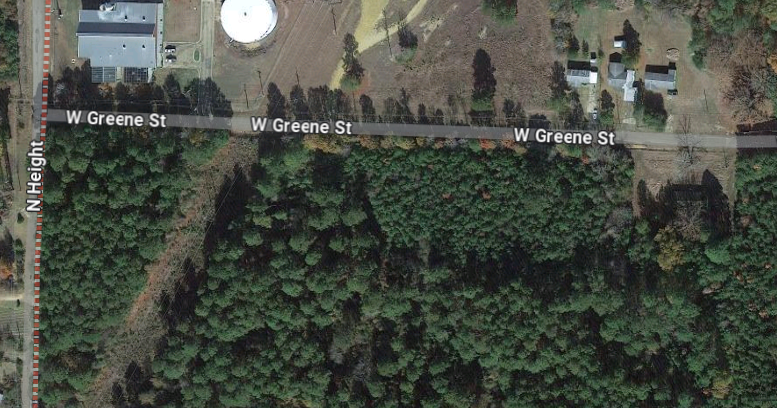Magnolia will be asked to rezone 18 acres for solar power facility
October 12, 2024

Scenic Hill Solar wants to build a commercial solar array in Northwest Magnolia, but it will first have to get Magnolia Planning Commission approval to have the 18-acre site rezoned.
On September 20, 2024, the Little Rock company bought the site from Arkansas Pulpwood Company of Camden for $235,000, or about $13,000 an acre.
The site is a rectangle of land located on the southeast corner of North Height and West Greene streets – on the south side of West Greene across the street from the City of Magnolia’s Sterling Lacy Water Treatment Plant and Entergy Corporation’s West Magnolia Substation.
The street address is 1255 W. Greene.
The Magnolia Planning Commission has posted a notice for its Monday, November 18, 2024 meeting about Scenic Hill Solar’s request to rezone the property from R1 residential to C3 commercial. The commission meets in the Magnolia City Council Chamber in the Police-Fire Building.
“Scenic Hill Solar XXXIV, LLC is asking for the property to be rezoned so they can build and operate a commercial solar array which will benefit several nonprofit rural health care facilities across the state of Arkansas,” the notice said.
R1 is one of the city’s most restrictive zoning classifications. According to the city’s zoning code, the classification is intended to provide for quiet, low density residential areas characterized by single-family homes and the supporting religious, recreational, educational, and institutional uses for an attractive, functional neighborhood.
Housing is permitted in a C3 zoning. C3 land use is usually along major highways or arterial streets “used primarily for the retailing of durable goods, implements, heavy appliances and vehicles; providing services and lodgings for transient visitors or diners; and for uses which because of their nature require open storage or display of goods or material; and which require large-scale advertising. As this district is generally located in close proximity to residential areas, the regulations are designed to permit development of enumerated uses but limited by standards and requirements that are intended to protect and preserve the abutting or surrounding residential districts, and to minimize potential traffic hazards,” the zoning regulations say.
The Arkansas Democrat-Gazette reported earlier this month that the University of Arkansas system is deploying 18 solar fields statewide to support its operations. In Magnolia, this would include the UAMS-South Campus on North Washington, and the Kids First center on West Calhoun.
An October 1 announcement by Climate United of Bethesda, MD provided more details.
Climate United said it is providing $31.8 million in pre-construction financing to support a Scenic Hill Solar project benefiting the entire University of Arkansas system. It is Climate United’s first investment from the $6.97 billion it received from the Environmental Protection Agency’s National Clean Investment Fund.
Climate United Fund, the prime grant recipient for the Climate United coalition and lender for this project, is financing pre-construction costs for Scenic Hill Solar to build 18 solar projects in 13 utility service territories.
“The project will directly benefit all UA students and staff while creating millions of dollars of economic benefits for local communities. The majority of the project’s solar power plants will be built in rural areas, strengthening local economies and creating good jobs in small towns across Arkansas,” the Climate United statement said.
Climate United said Arkansas will feel the investment’s impact in several ways.
The construction of 18 solar power plants will provide over $120 million of direct economic development in every region of Arkansas and employ hundreds of electricians, civil contractors, and construction workers. There’s been no word on how many people would be permanently employed by a solar power farm in Magnolia
In tandem, the UA System has launched educational and workforce development initiatives in renewable energy construction and electric vehicle (EV) repair to expose students to these growing sectors.
The project will generate over 4 billion kWh of clean electricity during the 40-year life of the solar power plants. The environmental benefits of this solar electricity generation are the equivalent of over 7 billion fewer passenger car miles or the planting of 46 million trees.
“This is a historic moment for solar power development in Arkansas, the Natural State. The partnership with Climate United is helping our company build the most ambitious and complex solar power development in Arkansas history. It’s a great day for Arkansans,” Bill Halter, CEO of Scenic Hill Solar, said in the Climate United statement. “The investment from Climate United is filling a national gap in financing mechanisms and thereby enhancing this project which benefits all Arkansans. We look forward to future opportunities with Climate United to accelerate deployment of solar power and batteries, power the Arkansas economy, enhance national security, and strengthen American manufacturing.”
“The UA System is proud to be a leader in the clean energy transition and help reduce air pollution across the state,” said Dr. Donald R. Bobbitt, president of the UA System. “Through this partnership with Scenic Hill and Climate United, the premiere university system in Arkansas is significantly reducing energy costs, of which the savings will help us to continue to deliver world-class education to students and make larger impacts overall on our campuses, divisions and units.”
Search
RECENT PRESS RELEASES
Related Post




